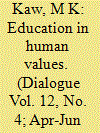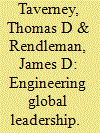| Srl | Item |
| 1 |
ID:
105265


|
|
|
| 2 |
ID:
105266


|
|
|
| 3 |
ID:
108945


|
|
|
|
|
| Publication |
2011.
|
| Summary/Abstract |
The economic greatness that the United States achieved in the last half of the twentieth century was not assured at the end of World War II. The ascension and U.S. economic juggernaut was secured by three seminal events: (1) the passage of the G.I. Bill; (2) the Soviets' Sputnik launch and the start of the Space Age; and (3) John F. Kennedy's challenge to go to the moon and the subsequent Moon Race. These events spurred the United States to seize and retain leadership in space technology development and space activities; the nation invested in education systems and students, and encouraged a competition that brought out the best from its engineers and scientists and inspired important efforts. The resulting technical genius has fostered advances in a wide variety of other technologies, improving the nation's quality of life. The United States now faces a difficult road ahead unless something is done to reverse recent downward trends in science, technology, engineering, and math education. The authors ask: where is our next G.I. Bill, Sputnik, or Moon Race?
|
|
|
|
|
|
|
|
|
|
|
|
|
|
|
|
| 4 |
ID:
161963


|
|
|
|
|
| Summary/Abstract |
In light of their nineteenth-century political economies, why did poor, agricultural Denmark become a leader in public, mass primary education (1814) and a multiple-track education system that included vocational training, while rich, industrial Britain did not create public, mass schooling until 1870, and embrace a one-track, academic secondary-education system? The author argues that literary narratives shed light on these cross-national differences. Danish narratives imagined education as social investment for a strong society; diverse educational tracks were necessary to meet the varied skills needs of the economy. British narratives portrayed schooling as essential to self-development and to cultivating the ideal individual. The author uses a close reading of texts and computational linguistics analyses of 521 Danish and 562 British works of fiction from 1700 to 1920 to document the different portrayal of education in the two countries. Case studies show that writers are crucial political actors in important reforms and understudied political agents in policy development stories. The method allows the author to evaluate empirically the complex relationship between culture and political outcomes, to falsify cultural claims, and to improve on thin, vague, national cultural arguments. The article shows how literature helps to reconcile the contradictions embedded in diverse models of governance. Literature provides a site for reworking cultural symbols in response to societal struggles over exogenous change, and provides a source of continuity at moments of institutional change.
|
|
|
|
|
|
|
|
|
|
|
|
|
|
|
|